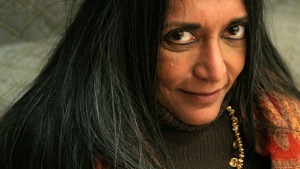Deepa Mehta rises to Midnight’s Children challenge By Richard Crouse For Metro Canada Thursday November 1, 2012
 In 2008, a year after Deepa Mehta’s film Water was nominated for an Oscar for Best Foreign Language Film, she teamed with Salman Rushdie to develop a movie from one of his novels.
In 2008, a year after Deepa Mehta’s film Water was nominated for an Oscar for Best Foreign Language Film, she teamed with Salman Rushdie to develop a movie from one of his novels.
“To this day I have no clue what made me turn around to him and say, ‘Hey Salman, who has the rights to Midnight’s Children?,’” she says.
As soon as Rushdie agreed to sign over the option to one of his best-known books, a door-stopping epic about Saleem Sinai, a Zelig-like character whose remarkable life was inextricably linked to India’s transition from British colonialism to independence and the partition of India, she was panicked, but only for a moment.
“I said, ‘O God, what have I done?’ Everything went through my mind at the same time: iconic book, iconic writer, Booker of the Booker, everyone knows it in the world, millions of readers… what have I done? Then that just left. All that doubt just left and I was thrilled.”
Saleem’s (Satya Bhabha) journey begins when he is born at the stroke of midnight, August 14, 1947, the precise moment India divided. He is one of the happy children “of the glorious hour,” joining an elite group of kids who share his birthday, including Shiva of the Knees, Saleem’s adversary and Parvati-the-witch.
Unfortunately for him, he can only see and hear them as visions in his head. His extrasensory ability, giant nose and questions about parentage make him an outcast in his own family. As he grows up he becomes a soldier, suffers amnesia, lives in exile, survives a “cleansing” of the Jama Masjid slum, is held as a political prisoner and reconnects with some of the Midnight’s Children.
“It’s basically a coming of age story,” says Mehta, who shot the film in 651 different locations in Sri Lanka over 69 days, “which is what attracted me to the book for years. It’s a story of searching for family. It’s about love, about finding a home and how sometimes bloodlines aren’t the only things that unite us.
“Saleem becomes a vehicle, a real, human vehicle who is an unlikely hero because he is certainly not one of The Avengers, and he is not Harry Potter nor is he an X-Man. He is a human, feeling, frail lovely, warm and ultimately a good guy. It’s just a lovely journey through history.”
